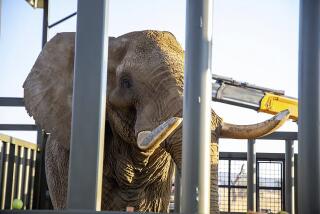TV REVIEW : ‘Elephant’ on PBS: A Grim Status Report
- Share via
What a thrill to see the birth of an elephant. A membrane-wrapped package falls to the ground, and almost immediately the wobbly, 175-pound calf struggles to stand and reach its mother’s milk, metaphorically becoming an entire species fighting for survival.
Therein lies the conflict of “Elephant,” the latest PBS special from the National Geographic Society, a celebration and a eulogy, a chronicle of birth and of slaughter.
It airs at 8 tonight on Channels 28, 15 and 24, and at 9 on Channel 50.
Much of “Elephant” is unpleasant, for here, in this wise and eloquent hour written and produced by Irwin Rosten, is another chapter in the eternal conflict among earth’s inhabitants. This one illogically pits humankind against the elephant, with the inevitable result looming ahead.
Filming in Laos, Sri Lanka, Thailand, India, Kenya and Zimbabwe, Rosten dramatically contrasts the Asian and African elephants and the historic roles of each on their respective continents.
The elephant traditionally has been respected in Asia. But these powerful, intelligent animals are also utilized as laborers and entertainers there, undergoing a brutal domestication in being bent to the will of humans whose economic livelihoods are dependent on them. And on another front, notes narrator E. G. Marshall, the Asian elephants are imperiled by “a tidal wave of people and their machines.”
The larger African elephant roamed the wilderness freely and was never domesticated, we’re told. But now that wilderness, too, is shrinking, even as the demand for the elephant’s ivory is growing. We’re given the ultimate paradox, beauty produced by carnage: pictures of exquisite ivory sculptures followed by pictures of elephants slain by poachers for their tusks, their decaying carcasses being picked at by vultures.
Weighed against this is that rare and wonderful birth sequence at a zoo in Portland, and also the monitoring of animal savers --scientists and others studying and working to preserve the elephant. “It’s probably only a holding action,” one of them admits.
The hour concentrates so heavily on this tenuous coexistence with humans that elephants in the wild--free, unencumbered and doing what comes naturally without human involvement--are largely absent from the program.
Yet this shortcoming itself becomes a grim status report of the elephant, who fills the screen tonight with his greatness and sadness.
More to Read
The complete guide to home viewing
Get Screen Gab for everything about the TV shows and streaming movies everyone’s talking about.
You may occasionally receive promotional content from the Los Angeles Times.






